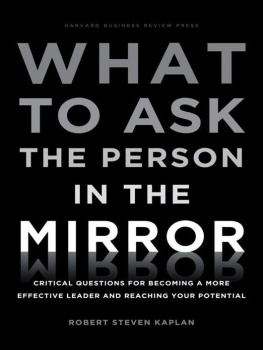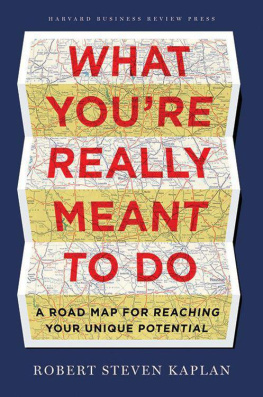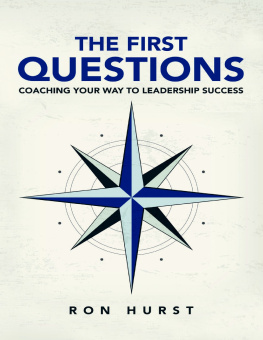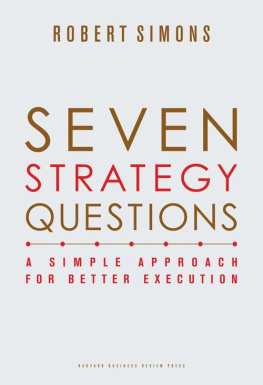Praise for What to Ask the Person in the Mirror
Drawing on years of experience in business and academia, Rob Kaplan has produced a very readable book that provides unique and valuable insights into management, including what makes and sustains highly successful leaders. Read this wonderful book if you want to understand how great managers grow and mature, navigate pitfalls, and bounce back from adversity.
Dr. Mohamed A. El-Erian, CEO, PIMCO; author, When Markets Collide
Rob Kaplans book is my new leadership bible. His extensive experience leading others and his time coaching great leaders has given him a unique understanding of what breeds success and failure. Leaders from any type of business can benefit from Kaplans guidance.
Caryn Seidman-Becker, CEO, CLEAR Corporation
For someone like me who is building a business and growing an entrepreneurial company, this book becomes the road map and go-to guide for asking the really tough questions that ultimately allow the truly successful business leader to emerge.
Tyra Banks, supermodel turned entrepreneur
WHAT
TO ASK
THE PERSON
IN THE
MIRROR
WHAT
TO ASK
THE PERSON
IN THE
MIRROR
Critical Questions for Becoming a More Effective Leader and Reaching Your Potential
ROBERT STEVEN KAPLAN
Harvard Business Review Press
Boston, Massachusetts
Copyright 2011 Robert Steven Kaplan
All rights reserved
Printed in the United States of America
10 9 8 7 6 5 4 3 2 1
No part of this publication may be reproduced, stored in or introduced into a retrieval system, or transmitted, in any form, or by any means (electronic, mechanical, photocopying, recording, or otherwise), without the prior permission of the publisher. Requests for permission should be directed to permissions@hbsp.harvard.edu, or mailed to Permissions, Harvard Business School Publishing, 60 Harvard Way, Boston, Massachusetts 02163.
Library of Congress Cataloging-in-Publication Data
Kaplan, Robert S.
What to ask the person in the mirror : critical questions for becoming a more effective leader and reaching your potential / Robert S. Kaplan.
p. cm.
ISBN 978-1-4221-7001-4 (alk. paper)
1. Leadership. 2. Executive ability. I. Title.
HD57.7.K3663 2011
658.4'092dc22
2011008441
The paper used in this publication meets the requirements of the American National Standard for Permanence of Paper for Publications and Documents in Libraries and Archives Z39.48-1992.
To my parents, who taught me to never stop asking questions, and to all those who over the generations have protected our right to do so.
Contents
5 Evaluation and Alignment
Introduction
Great leadership is not about having all the answers it is, more often, about having the courage to ask the critical questions
How do you go about improving your ability to be a more outstanding executive and leader?
Is this something you can learn?
Can leadership skills be taught?
Are excellent leaders made or born?
How do the great ones do it?
Many people believe that great leaders are just blessed with a knack for having the right answers. They believe that these people have a natural instinct for knowing what to do in any given situationhow to stay on track, inspire employees to work toward a common goal, organize effectively, and drive their businesses. Superb leaders, they suspect, are born with certain talents, insight, and charisma that make them different from the rest of us. Of course, these excellent leaders are very sure of themselvesbecause it comes so naturally to them!
It is a pretty common notion: there is a rarified species of successful leaders who follow an orderly path upward during their careers, consistently avoid significant setbacks, do not suffer periods of confusion, seldom feel like failures, and have an uncanny knack for looking around corners and seeing into the future.
Sounds nice, but I dont think so.
Over the past twenty-five yearsfirst as a business executive and then as a professor of management practice at Harvard Business SchoolI have led several businesses and regularly advised a wide variety of senior executives and emerging leaders. I have certainly made my share of mistakes and, from them, gained greater insight into leadership approaches that tend to enhance executive effectiveness as well as those practices that often undermine performance.
In the course of these experiences, I have found that almost without exception, successful leaders go through significant periods of time in which they feel confused, discouraged, and unsure of themselves and their decisions. They feel as if they should be somewhere else, doing something else. They wonder why other executives seem to have an easier time doing their jobs. They go through wrenching phases in which they grasp for answers and feel fundamentally alone. Even as they project an air of confidence, they harbor deep feelings of uncertainty and apprehension.
Many successful executives find it hard to believe that other successful peers are feeling this way. If thats true, they often ask me skeptically, then whats the difference between successful executives and those who are less successful?
My answer: a key difference between those who reach their potential and those who dont is how they deal with these periods of confusion and uncertainty. The trick lies not in avoiding these difficult periods; it lies in knowing how to step back, diagnose, regroup, and move forward.
Lonely at the Top
Of course, this is far easier to describe than to accomplish. As executives become more seniorperhaps ultimately becoming chief executive of their organizationsit becomes far more difficult to get timely and constructive feedback, maintain an accurate self-perception, and develop early warning systems for emerging problems. At this point in your career, you have fewer (if any) superiors closely observing your behavior. As a result, the first time youre likely to hear a critique of your performance is during your year-end review with your bossor, if youre CEO, with your board of directorsor perhaps when your business experiences a visible setback. By that time, unfortunately, it may be too late to take the kinds of corrective actions that could prevent permanent damage to your business, or to your career.
The phrase lonely at the top is overused. Its a succinct and accurate way, though, to capture the dilemma I am describing.
I have certainly experienced this difficult dilemma myself and also observed it in other executives over the course of my career and, particularly, since coming to Harvard. As a result of these experiencesI have come to believe that, for most leaders, 90 percent of the battle is being able to step back and take the time to ask the right questionsquestions that help you figure out how to gain insight, regroup, and move forward.
Asking the Critical Questions
Let me stress, again, that successful business leaders seldom have all the answers. Instead, they are very good at knowing how and when to ask the critical questions that help them frame issues, diagnose problems, and develop action plansboth for their companies and for themselves. In this way, these executives are able to work through adversity and get themselves and their companies back on track.







